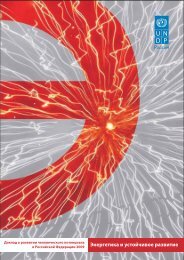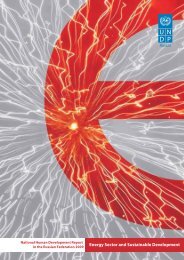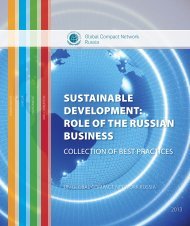Box 1.1. Correlation between climate change, the energy sectorand human developmentClimate change is one of the most dramaticgeopolitical and economic problems of the century,since it poses a real threat to human development andbetter quality of life worldwide in both the short andlong term. Production and combustion of fossil fuelsare one of the main causes of registered increase inGHG emissions and resulting quickening of the globalclimate change process. In <strong>Russia</strong> over 72% of GHGemissions are related to use of fossil fuels.Climate monitoring records by thenational hydrometeorological network, as well asscientific publications by <strong>Russia</strong>n and foreignscientists on global climate change and itsconsequences show significant negative and, insome cases, positive impact from climate changeon <strong>Russia</strong>’s natural environment and socioeconomicdevelopment, both nationally and byregions. The Assessment <strong>Report</strong> on ClimateChange and its Impact on the <strong>Russia</strong>n Federation,prepared in 1998 by experts of the StateHydrometeorological Committee (Roshydromet),the <strong>Russia</strong>n Academy of Sciences and specialistsfrom the country’s universities 8 , did much to focusattention on severity of the problem.Climate change will have negative impacton many parts of the national economy and theenergy sector may be among the hardest hit.Energy facilities in Siberia and northern territoriesare particularly vulnerable due to thawing ofpermafrost, which covers two thirds of <strong>Russia</strong>’sterritory. It is expected that depth of seasonalmelting will increase by 30-50% by 2050, which willcreate new technical challenges for the resourceextraction industry in the <strong>Russia</strong>n Arctic and Siberia.Communities and energy infrastructure intraditional permafrost areas are particularly at risk.In Western Siberia 21% of all accidents on trunk oiland gas pipelines have mechanical causes,including failure of foundations and deformation ofsupports.Further melting of the permafrost coulddamage even larger facilities, such as oil depots.Special technical projects will be needed in orderto prevent an increase of oil and gas pipelinefractures.Forecast change of flow volumes in riverswill change the of water influx to large reservoirs.Forecasts predict a 5-10% increase of water influxto the Volga-Kama reservoir series and toreservoirs in the North-Western Federal District.Water influx to reservoirs on the Angara andYenisei rivers, and also on the Viluy, Kolyma, andZeya rivers will increase by between 0% and 15%.Changes in river flow due to expected climatechanges will force reassessment of reservoiroperation procedures with respect to main users(especially power generating facilities) and theenvironment.<strong>Russia</strong>’s transportation infrastructure isalso at risk. Increasing volume and frequency ofprecipitation, and the fact that winterprecipitation will increasingly be in the form ofrain, rather than snow, will tend to destabilize roadbeds and weaken support walls. Prolonged dryperiods could result in soil subsidence beneathstructures and buildings. Larger temperaturefluctuations will speed up road degradation.Permafrost melt is already destroying winter iceroads, which are vitally important for the oil andforestry segments.<strong>Russia</strong> is more subject to weather extremesthan other countries of Europe and Central Asia andvulnerability of the country’s economy reflects itslarge tracts of territory with unfavorable ecologicalconditions and poor condition of the country’sinfrastructure.Benefits from climate changes in <strong>Russia</strong>include reduction of heating costs, greater potentialfor agriculture and forestry, ability to developshipping along the Northern Sea Route, as well asgreater access to, and hence production of, mineralresources and biological marine resources.Both positive and negative climate changeimpacts require complex and professional study. Itis important to develop climate risk assessment andforecasting research, as well as studies of theirpossible benefits for the energy industry and othersegments so that these factors can be taken intoaccount when making long- and medium-termstrategic decisions.8Assessment <strong>Report</strong> on Climate Change and its Impact on the <strong>Russia</strong>n Federation: General Summary, Roshydromet, 200826National Human Development <strong>Report</strong> in the <strong>Russia</strong>n Federation 2009
Although the United Nations ClimateChange Conference in Copenhagen in 2009 did notmark a breakthrough in putting the climate issue atcenter stage of the world economy and nationaleconomies, its results will have major impact forstrengthening and expansion of the drive towardslow-carbon development, which the leading nationsof the World are embarked upon. The CopenhagenAccord (the political document developed andadopted by world leaders at the Conference)confirmed the commitment of most developedcountries to keep global warming under 2 o C andstart immediate actions for prevention of andadaptation to climate change, to organize relevantfinancing and technologies, and to stop forestdevastation in developing countries. The strategicmeasures for energy saving and GHG emissionsreduction at the national level that have alreadybeen adopted or are under development willinfluence global markets (both markets fortraditional fuel & energy, and the new market forGHG emission certificates) and will encouragetransfer and distribution of energy-efficient and lowcarbon technologies.Adoption of the Climate Doctrine of the<strong>Russia</strong>n Federation, signed by the <strong>Russia</strong>n Presidenton November 17, 2009, is an important stepforward. The Doctrine sets out attitudes towards thegoal, principles, content and means ofimplementation of a unified climate change policyin the <strong>Russia</strong>n Federation. The strategic goal of the<strong>Russia</strong>’s climate change policy is to ensure safe andsustainable national development, including theinstitutional, economic, environmental and social(including demographic) aspects of suchdevelopment, in the context of climate change andrelated threats and challenges. The Doctrine paysspecial attention to development of <strong>Russia</strong>n climatescience, which many prominent experts believe tobe in need of strong state support.Objective media coverage of problemsrelated to climate change and its implications,including ‘popular science’ approaches to climateawareness, is a priority for <strong>Russia</strong>. Successfuldevelopment and implementation of <strong>Russia</strong>’s climatechange policy will depend on greater environmentalawareness and understanding of climate changeissues among government officials, business people,civil society and the general public.Almost simultaneous adoption of theClimate Doctrine and of the Energy Policy of <strong>Russia</strong>up to 2030 (approved by Governmental DecreeNo.1715-r, dated November 13, 2009) bodes well forclose integration of energy and climate policies withrespect to action plans and socio-economicdevelopment programmes.27
- Page 1 and 2: National Human Development Reportin
- Page 3 and 4: National Human Development Reportin
- Page 5 and 6: ACKNOWLEDGEMENTSThe authors express
- Page 7 and 8: Dear Reader,You have before you the
- Page 9 and 10: PREFACEThis is the 13 th National H
- Page 11 and 12: country’s fuel & energy regions r
- Page 13 and 14: environmental degradation and enhan
- Page 15 and 16: Chapter 1The Energy Sector,the Econ
- Page 17 and 18: By 2008 Russia had increased its sh
- Page 19 and 20: the share of energy in the national
- Page 21 and 22: exported, increased. However, this
- Page 23 and 24: elimination of structural and terri
- Page 25 and 26: • Establishment of competitive me
- Page 27: number of developed countries, incl
- Page 31 and 32: industrial region of the Urals - Sv
- Page 33 and 34: 2.2. Budget capacityand structure o
- Page 35 and 36: (the Federal State Statistics Servi
- Page 37 and 38: Immigration by young and highly ski
- Page 39 and 40: energy regions exacerbate the incom
- Page 41 and 42: Khanty-Mansi and Yamal-Nenets Auton
- Page 43 and 44: the Ministry for Regional Developme
- Page 45 and 46: various other long-term problems in
- Page 47 and 48: is also associated with the fuel an
- Page 49 and 50: Republic of Mordovia 8051 0.732 68.
- Page 51 and 52: Legislative control of impact audit
- Page 53 and 54: Chapter 3Personal Incomes, the Ener
- Page 55 and 56: than any other sources of income -
- Page 57 and 58: Are wages now the main instrument f
- Page 59 and 60: comparison of month-on-month develo
- Page 61 and 62: • The unemployed, people who aree
- Page 63 and 64: Employment in the energy sector acc
- Page 65 and 66: The share of household expenditures
- Page 67 and 68: subsidization practices in the regi
- Page 69 and 70: in power use between regions now de
- Page 71 and 72: Electricity prices for households h
- Page 73 and 74: • Steady decrease in the percenta
- Page 75 and 76: 1. The number of graduates with eng
- Page 77 and 78: As well as requiring better fuelcom
- Page 79 and 80:
Box 4.1. The village of Kolvain Uss
- Page 81 and 82:
continue to use solid fuel for a lo
- Page 83 and 84:
Box 4.3. Ambient air pollution andp
- Page 85 and 86:
either by large power generating fa
- Page 87 and 88:
Box 4.6. A city at riskNovocherkass
- Page 89 and 90:
In order to assess impact of thesee
- Page 91 and 92:
generation facilities through safer
- Page 93 and 94:
achieved in developed countries. So
- Page 95 and 96:
equires 2-6 times more capital inve
- Page 97 and 98:
government) should set targets and
- Page 99 and 100:
networks. In 2007 government budget
- Page 101 and 102:
enhancement is also important. Ener
- Page 103 and 104:
energy efficiency of the transport
- Page 105 and 106:
Box 5.1. Programme of the Ministry
- Page 107 and 108:
educational and informational suppo
- Page 109 and 110:
mechanism for using national quota
- Page 111 and 112:
Figure 6.2Share of electricity gene
- Page 113 and 114:
One of the major benefits of renewa
- Page 115 and 116:
odies; outdoor air; rocks and soil;
- Page 117 and 118:
Design and construction of geotherm
- Page 119 and 120:
Box 6.3. Prospects for nuclear powe
- Page 121 and 122:
consists of out-dated equipment at
- Page 123 and 124:
ConclusionThe world’s nuclear pow
- Page 125 and 126:
7.1. Impact of the fuel& energy sec
- Page 127 and 128:
Table 7.5Solid waste from productio
- Page 129 and 130:
Table 7.7Areas of disturbed and rec
- Page 131 and 132:
nature of the impact (atmospheric e
- Page 133 and 134:
Further, the economic cost ofenviro
- Page 135 and 136:
trends continued the damage would a
- Page 137 and 138:
What the government needs to do ino
- Page 139 and 140:
Figure 7.2.1Specific atmospheric em
- Page 141 and 142:
money value of industrial output) c
- Page 143 and 144:
Figure 7.2.4Trends in specific atmo
- Page 145 and 146:
Chapter 8The Energy Industry and Su
- Page 147 and 148:
eing equal) it only reflects that p
- Page 149 and 150:
(MDGs), issued by the UN in 2000. T
- Page 151 and 152:
8.4. The energy factorin integral i
- Page 153 and 154:
Canada, the USA and Great Britain h
- Page 155 and 156:
Box 8.2. Energy efficiencyindicator
- Page 157 and 158:
Box 8.4. Energy efficiency rating o
- Page 159 and 160:
41 Penza Region 116.0 -35.2 -4.542
- Page 161 and 162:
Appendix to Chapter 1Table 1.1. GDP
- Page 163 and 164:
Attachment to Chapter 4Table 4.1Rus
- Page 165 and 166:
Attachment to Chapter 4Volga Federa
- Page 167 and 168:
Attachment to Chapter 4Belovo Belov
- Page 169 and 170:
The previous National Human Develop












